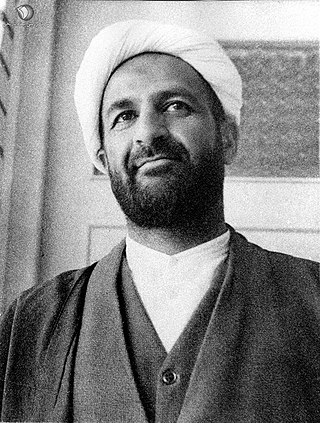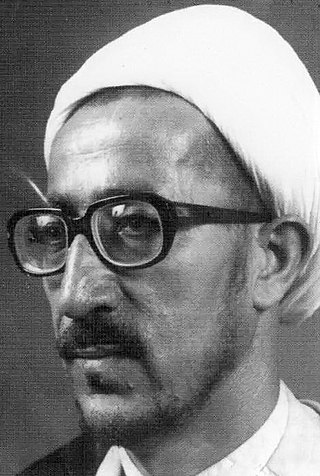A hawza or ḥawzah ʿilmīyah is a seminary where Shi'a Muslim scholars are educated.

Azadeh Moaveni is an Iranian-American writer, journalist, and academic. She directs the Gender and Conflict Program at the International Crisis Group, and lectures on journalism at New York University’s London campus. She is the author of four books, including the bestselling Lipstick Jihad and Guest House for Young Widows, which was shortlisted for numerous prizes. She contributes to The New York Times, The Guardian, and The London Review of Books.

Hajiyeh Seyyedeh Nosrat Begum Amin, also known as Banu Amin, Lady Amin, was Iran's most outstanding female jurisprudent, theologian and great Muslim mystic (‘arif) of the 20th century, a Lady Mujtahideh. She received numerous ijazahs (permissions) of ijtihad, among them from Ayatollahs Muḥammad Kazim Ḥusayni Shīrāzī (1873-1947) and Grand Ayatullah ‘arif (1859-1937), the founder of the Qom seminaries (hawza).
Haghani school is a Shi'i school of thought in Iran based in the holy city of Qom and formerly headed by Ayatollah Mohammad Taghi Mesbah Yazdi, an influential theologian. The Haghani Circle has its origin in the Haghani seminary, founded in 1964, which previously had been called Muntashiriya. After Ayatollahs Qoddusi and Beheshti, two of the leading members of the circle, were assassinated in 1981, the hawza changed its name to Shahidan Seminary.

The Shrine of Fatima Masumeh is located in Qom, which is considered by Twelver Shia Muslims to be the second most sacred city in Iran after Mashhad.

The Qom Seminary is the largest Islamic seminary (hawza) in Iran, established in 1922 by Grand Ayatollah Abdul-Karim Haeri Yazdi in Qom. It trains Usuli scholars.
Zīnah al-Sādāt Humāyūnī, also Alavīyah Humāyūnī, Zinatossadat Alevi Homayooni or Homayuni, was a female religious scholar from Isfahan, Iran, who is the most prominent student of Iran's leading mujtaheda of the 20th century, Banu Amin.
The Dar al-Tabligh was a Shiite seminary in Qom. It was established in the mid-1960s by eminent grand ayatollah Mohammad Kazem Shariatmadari and soon emerged as one of the most popular hawza for Iranian and foreign students, with a prolific publishing outlet.
Maktab-e Tawhid was a Shi'i seminary for women, established in Qom, Iran's clerical center in 1975, as a wing of the Haghani school.
Sayyida Farideh Mostafavi Khomeini is an Iranian female religious scholar and Ayatollah Khomeini's youngest daughter.
Jami'at al-Zahra is the world's main Shia seminary for women. It is located in Qom, Iran.

Ali Qoddusi (1927–1981) was an Iranian cleric and a major actor in the 1979 revolution.
Dar al-Zahra was the first women's Shia seminary to be opened in Qom. It was established by grand ayatollah Mohammad Kazem Shariatmadari, who opened it in 1973 as a section of his hawza Dar al-Tabligh.
Makhzan al-Irfan fi Tafsir al-Quran is a 15 volume tafsir by the Twelver Shia Islamic scholar and the only mujtahida of 20th century Banu Amin.
Minoo Moallem is an Iranian-born American educator, author, and scholar. She is a Professor of Gender and Women’s Studies at the University of California at Berkeley. Her academic specialties are transnational and postcolonial feminist studies, religious nationalism and transnationalism, consumer culture, immigration and diaspora studies, Middle Eastern Studies and Iranian films, cultural politics. She is best known for her work on Islamic nationalism and fundamentalism as byproducts of colonial modernity and modernization of patriarchies.
Jamiat-ul-Ulama Isna Asharia, Kargil-Ladakh is a socio-religious institution of Kargil, Ladakh in Indian Administered Kashmir catering mainly to the socio-religious needs of the region. It was founded in 1953, and has jurisdiction over Ulemas of the region and deputes them to villages where they guide people in religious matters, run Madrasas and works as prayer monitors. It also organises the Friday prayers in the Kargil town.

The Guidance Patrol or morality police is an Islamic religious police force and vice squad in the Law Enforcement Command of the Islamic Republic of Iran. The Guidance Patrol enforces Sharia—Islamic law—per laws in Iran; this is most often the enforcement of Islamic dress code, such as ensuring women in the country wear hijabs. The Guidance Patrol was formed in 2005 as a successor organisation to the older Islamic Revolution Committees, and reports to the Supreme Leader.
Marji', literally meaning "source to follow" or "religious reference", is a title given to the highest level of Twelver Shia religious cleric, with the authority given by a hawzah to make legal decisions within the confines of Islamic law for followers and clerics below him in rank. The highest ranking marjiʿ is known as the marja al-mutlaq or marja al-taqlid al-mutlaq. A Marji' is also, or usually is also, a Grand Ayatollah.

Azadeh Kian-Thiébaut is an Iranian-French academic, Professor of Sociology, Director of the Social Sciences department and Director of the Center for Gender and Feminist Studies at the University of Paris. She is included and recognized in the BBC project 100 Women.

Abd al-Rahim Aqiqi Bakhshayishi was an Iranian Islamic jurist, religious writer, journalist and translator, widely known for his biographies of Twelver Shia scholars. Born in Bakhshayesh village of Heris County to an Azeri farmer family. He completed his religious studies in Qom with prominent scholars and graduated from Tehran University in 1971. From religious journalism, he started his independent writing and activities in 1961. A pro-Khomeini during 1979 revolution, Aqiqi was also active in the Islam Da'wah as a Twelver Shia faqih. He died in Qom at the age of seventy and left many works and translations from Arabic to Persian.







